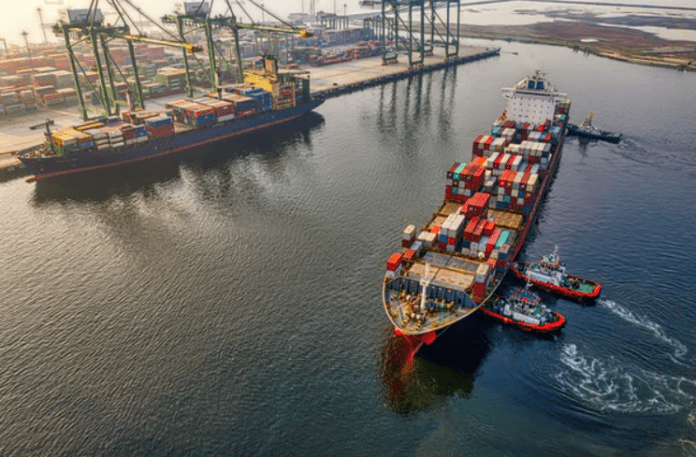Container shipping will be the hardest hit shipping sector in January when the European Union Emissions Trading System (EU ETS) goes live with the carriers liable for around €1.82 billion in carbon charges at today’s prices, by 2026.
The EU ETS will be introduced gradually from 2024, with carriers liable for 40% of emissions in the first year, rising to 70% in 2025 and 100% by 2026, and Albrecht Grell, MD at OceanScore said the bill for the EU ETS will total around €6.5 billion, depending on the cost of EU Allowances (EUAs), calculated using today’s fleet deployments.
Moreover, Grell, speaking at the launch of tech start-up OceanScore, responding diplomatically to questions regarding a global market-based measure (MBM) said, “I do not believe that the framework at the IMO is sufficiently large enough for a global MBM to be accepted by the nation states.”
More likely, according to Grell is the proliferation of regional MBM measures with all the challenges that will create for both shipping, which will have to navigate multiple regulations, and the regulators, who will need to decide who profits from the carbon charges and where the boundaries lie for each jurisdiction.
Container shipping lines have said that the charges levied from the EU ETS will be passed on to shippers and forwarders, with Evergreen announcing charges of €27/dry container and €41/reefer on the Asia to Europe trades. Similar charges will be levied by most other lines.
However, the EU ETS will create another accounting clerical management requirement for the lines and Grell was in London to outline a possible solution for the carriers to manage the new regulatory requirements.
OceanScore is a one-stop automated system for dealing with payment of EUAs and managing the EU ETS, although Grell acknowledges that there will always be manual inputting of a limited amount of the data, mainly due to the access requirements to the Union Registry, where EUAs are acquired.
According to Grell, a number of functions around the EU ETS remain to be clarified, including which facilities are considered transshipment ports, thereby clarifying the last port of call for EU ETS purposes and who is liable for buying the EUAs, the owner or ship manager, while many charters have yet to be modified to account for the new regulation.
Moreover, there will be a need for the carriers to take cash payments and buy EUAs, while the responsibility for buying the correct number of EUAs, estimated at 6,000 per vessel per European port call.
Managing the system will require trained and dedicated staff said Grell, putting OceanScore at the forefront of meeting those challenges, which has been recognised by such companies as MSC and vessel owner Peter Döhle.
Matthias Bloete, director of finance, controlling & corporate development at Döhle explained why the company had decided to partner OceanScore, “Although OceanScore is a start-up it has a hugely experienced team with many years of shipping experience, which means that the solution has practical processes and the handling and usability is very good.”
Mary Ann Evans
Correspondent at Large







